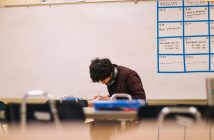Taking the SAT is far more expensive than it should be, especially when you factor in all the tutors, prep courses, and practice books in preparation for the actual test. I didn’t think my intended prep course justified its price tag, so I decided to study for the test myself. Not only was it a great deal cheaper, as I sourced my own materials and was my own teacher, but it was also more effective.
Of course, studying for a standardized test by yourself requires lots of determination and self-control. I looked at my DIY prep course as a voluntary class where I was both the teacher and the student. It sounded like a recipe for disaster, but it worked for me and I was satisfied with how I did. This blog post will outline how your child can ace the SAT themselves and save tons of money on the way.
Draw up a schedule, find a routine: I set aside two hours every Monday, Wednesday, and Thursday night to take practice tests and review test material. This schedule remained the same for maybe two months, so it was easy for me to fall into routine and make sure other things didn’t get in the way.
A lot of my study consisted of practice tests. I made sure to simulate the test experience as best I could. I didn’t study with music and although I was tempted many times to look up a word I knew I knew, I resisted because that opportunity wouldn’t present itself on the test.
Plan each lesson and tailor it to your child’s needs: Figuring out what I needed to work on before studying was really helpful and made sure I was being effective. For example, I knew that the math section was going to slay me, so I made sure one night a week was dedicated to doing just the math sections of practice tests. Conversely, I never wrote the essay prompt because I had consistently scored well on the essay.
Stay motivated and don’t fall off the wagon: This is much easier said than done, but from my experience a strong support system and good schedule are key. My parents helped me by asking if I needed help but not hovering over me and asking how I was doing. The daily “How’s school?” did not become “How’s the SAT?” and for that I’m very grateful.
At the peak of my study regime, I was averaging three tests a week and the pace nearly drove me crazy. However, I kept my Fridays strictly free so I would have something to look forward to and keep me going. No one should fault your child for rewarding themselves for hard work.
Always reflect and be prepared to modify your lesson: As your child works on their skills and takes more tests, their needs are going to change. To notice that change, you should think of your tests as an indicator of your progress and not just a to-do that needs to be done. Never make the same mistake twice by writing down words you don’t know and working on math problems you missed.
Make sure that progress in one area doesn’t result in regress in another by not totally dropping the ball on something you’re confident in. I wrote above that I never wrote the essay prompt, but I still outlined it as I would on the real test and knew exactly what examples I would use and what my thesis would be.
No matter how you study, you’re going to want a lot of practice tests. Buying books and tests from the US can be costly, but there are plenty of ways to get your hands on them in Beijing.
Garage sales, trunk sales, and flea markets organized by your school or your compound are a good place to start. Many people don’t do all the tests in a book and are willing to sell them at a huge markdown. Half-done tests can also be helpful since your child can sort through the bits and pieces and use them for practice in specific sections.
As can be expected from the land of the gaokao, China takes tests seriously. I quickly typed “SAT” into Taobao and using minimal (see: no) Chinese reading found lots of options, including all the tests from the last nine years for RMB 65. It may not be the cheapest option out there, but for RMB 65 I wouldn’t even bother scrolling further.
Although colleges are slowly making the SAT optional, standardized testing is still an expensive reality, especially for students outside of the US. Since you can’t avoid the test fee, international handling fee, and postage, you might as well save where you can and still do well at the same time.
Photo courtesy of PublicDomainPictures (Pixabay)
Heather Budimulia is a rising college sophomore, beijingkids’ intern and 北京人in progress. Though originally from Singapore, she spent a decade in Beijing and since she learned to bake and fell in love with publication there, considers it her home. When not in the office or storing sleep for college, she’ll probably be in a coffee shop with a good book, her journal or a stranger (or all three).




